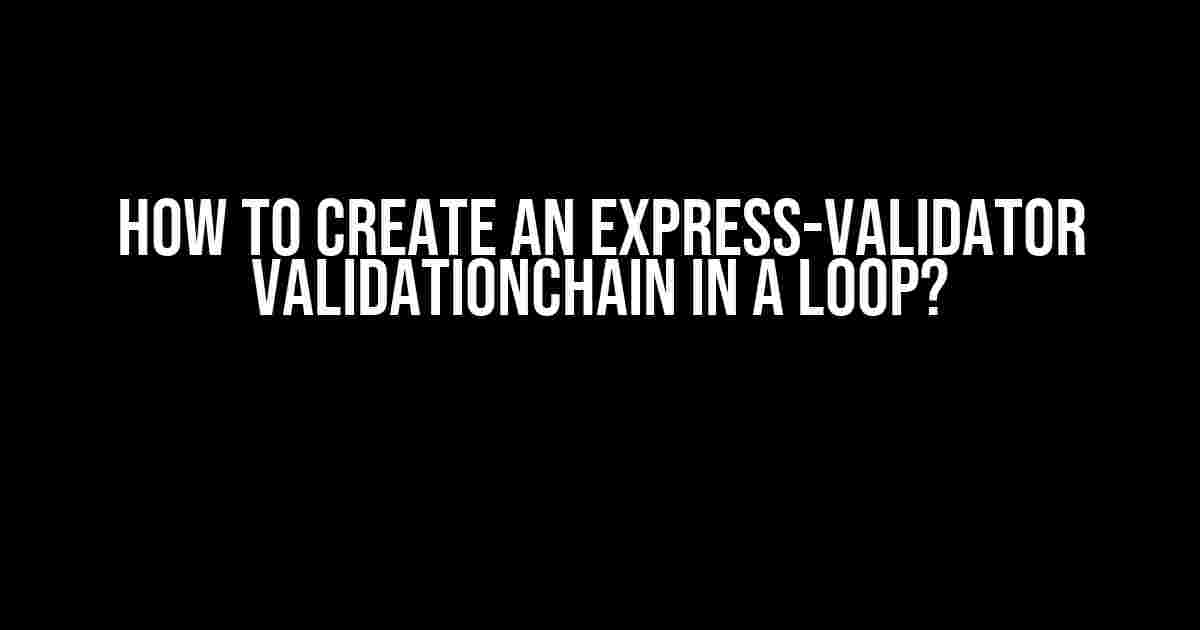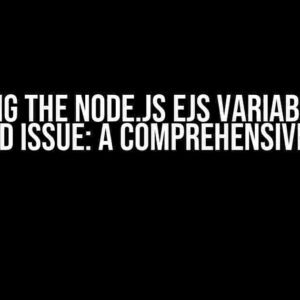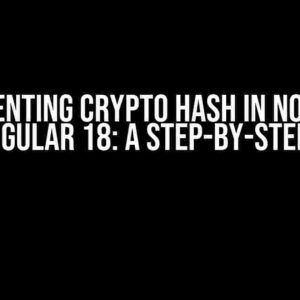Are you tired of writing repetitive code to validate user input in your Express.js application? Do you want to know the secret to creating a dynamic validation chain using express-validator? Look no further! In this article, we’ll show you how to create an express-validator ValidationChain in a loop, making your code more efficient and scalable.
What is Express-Validator?
Express-validator is a popular validation middleware for Express.js that allows you to validate user input data. It provides a simple and intuitive way to validate data using a chain of validation rules. But, what if you need to validate a dynamic set of fields or a large amount of data? That’s where creating a ValidationChain in a loop comes in.
Why Do You Need to Create a ValidationChain in a Loop?
Imagine you’re building a RESTful API that accepts a large JSON payload. You need to validate each field in the payload to ensure it meets certain criteria. Writing a separate validation rule for each field can be tedious and error-prone. By creating a ValidationChain in a loop, you can dynamically generate validation rules based on the payload, making your code more flexible and maintainable.
Example Scenario
Let’s say you’re building an e-commerce API that accepts a JSON payload containing product information. The payload can contain any number of fields, such as `productName`, `price`, `description`, and so on. You want to validate each field to ensure it’s not empty and meets certain formatting criteria. Without a loop, you would need to write separate validation rules for each field, like this:
app.post('/products', [
body('productName').not().isEmpty(),
body('price').notEmpty(),
body('description').isLength({ min: 10 }),
// ...
])This approach is not only verbose but also inflexible. What if you need to add or remove fields in the future? By creating a ValidationChain in a loop, you can dynamically generate validation rules based on the payload, making it easier to maintain and scale your API.
How to Create a ValidationChain in a Loop?
Now that we’ve established the benefits of creating a ValidationChain in a loop, let’s dive into the implementation. We’ll use the `express-validator` middleware and the `body` function to create a dynamic validation chain.
Step 1: Define the Payload Schema
First, define the payload schema as an object. This object will contain the field names as keys and their corresponding validation rules as values.
const payloadSchema = {
productName: {
notEmpty: true,
minLength: 3,
},
price: {
notEmpty: true,
isNumeric: true,
},
description: {
notEmpty: true,
minLength: 10,
},
// ...
};Step 2: Create an Empty ValidationChain
Next, create an empty ValidationChain using the `validationChain()` function from `express-validator`.
const { validationChain } = require('express-validator');
const validationChain = validationChain();Step 3: Loop Through the Payload Schema and Add Validation Rules
Now, loop through the payload schema and add validation rules to the ValidationChain using the `body()` function.
Object.keys(payloadSchema).forEach((field) => {
const rules = payloadSchema[field];
Object.keys(rules).forEach((rule) => {
validationChain.push(body(field)[rule]);
});
});In this example, we’re using the `Object.keys()` method to iterate through the payload schema and extract the field names. We then use another `Object.keys()` method to iterate through the validation rules for each field and add them to the ValidationChain using the `body()` function.
Step 4: Use the ValidationChain in Your Route Handler
Finally, use the ValidationChain in your route handler to validate the incoming request.
app.post('/products', validationChain, (req, res) => {
// If the validation passes, the request will reach this point
console.log('Validation passed!');
res.json({ message: 'Product created successfully!' });
});In this example, we’re using the `validationChain` as a middleware function in our route handler. If the validation passes, the request will reach the next middleware function or the route handler. If the validation fails, the error will be handled by the `errorHandler` middleware (not shown in this example).
Benefits of Creating a ValidationChain in a Loop
By creating a ValidationChain in a loop, you can:
- Dynamic generate validation rules based on the payload schema
- Reduce code duplication and improve maintainability
- Scale your validation logic to accommodate large payloads or complex schema
- Improve code readability and simplicity
Conclusion
Creating an express-validator ValidationChain in a loop is a powerful technique for dynamically generating validation rules based on the payload schema. By following the steps outlined in this article, you can improve the maintainability, scalability, and readability of your Express.js application. Remember to define your payload schema, create an empty ValidationChain, loop through the payload schema, and add validation rules to the ValidationChain. Finally, use the ValidationChain in your route handler to validate incoming requests.
| Keyword | Description |
|---|---|
| express-validator | A popular validation middleware for Express.js |
| ValidationChain | A chain of validation rules used to validate user input data |
| payload schema | An object defining the field names and their corresponding validation rules |
By mastering the art of creating a ValidationChain in a loop, you’ll be well on your way to building robust, scalable, and maintainable Express.js applications. Happy coding!
Here are 5 questions and answers about creating an express-validator ValidationChain in a loop:
Frequently Asked Question
Get ready to validate your Express.js app like a pro!
Can I create an express-validator ValidationChain in a loop?
Yes, you can create an express-validator ValidationChain in a loop. You can use the `chain()` method to create a new ValidationChain instance and then iterate over your validation rules to add them to the chain.
How do I add validation rules to a ValidationChain in a loop?
You can add validation rules to a ValidationChain in a loop using the `chain()` method and then calling `append()` or `checkpoint()` methods to add your validation rules. For example, `const validations = [{ field: ‘name’, rules: ‘isLength(3,10)’ }, …];` `const chain = validate();` `validations.forEach(validation => chain.checkpoint(validation.field, validation.rules));`
What if I need to add multiple validation rules to a single field?
If you need to add multiple validation rules to a single field, you can pass an array of rules to the `checkpoint()` method. For example, `validations.forEach(validation => chain.checkpoint(validation.field, [validation.rules, …]));` This will apply all the rules to the specified field.
Can I use async validation rules in a ValidationChain created in a loop?
Yes, you can use async validation rules in a ValidationChain created in a loop. Just make sure to use the `async` keyword when defining your validation rule function, and express-validator will take care of the rest. For example, `validations.forEach(validation => chain.checkpoint(validation.field, async (value) => { … });`
How do I handle errors in a ValidationChain created in a loop?
To handle errors in a ValidationChain created in a loop, you can use the `withErrors()` method to catch any errors that occur during validation. For example, `chain.withErrors((errors) => { … });` You can then handle the errors as needed, such as by sending a 400 response with the error messages.




